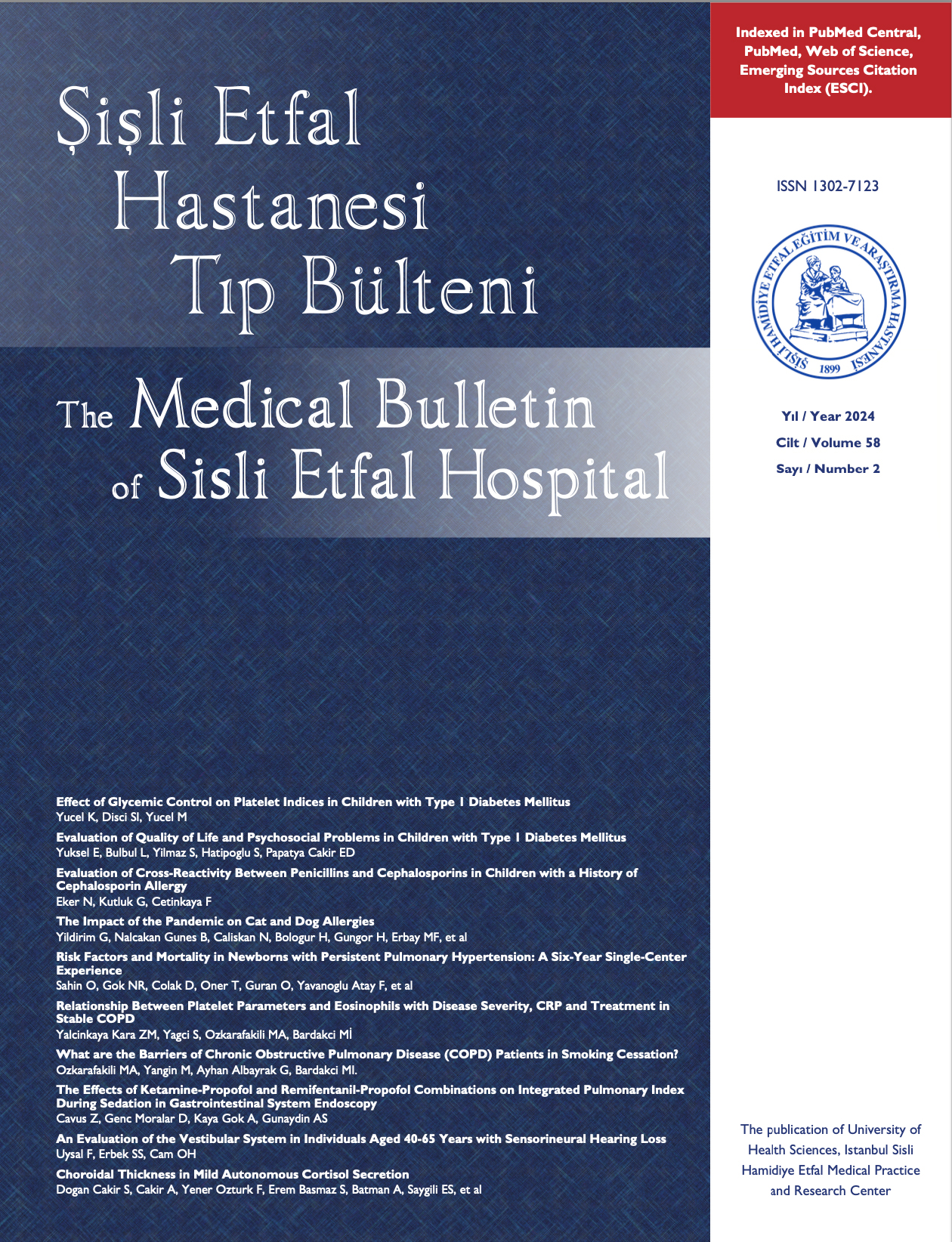
İdiyopatik Epilepsili Çocuklarda Levetirasetam Monoterapisinin Hematolojik Parametreler Üzerine Kısa ve Uzun Dönemli Etkileri
Habibe Koc Ucar1, Esra Sarigecili1, Sevcan Bilen2, Sinem Sari21Türkiye Sağlık Bilimleri Üniversitesi Adana Şehir Eğitim ve Araştırma Hastanesi Çocuk Nörolojisi Anabilim Dalı, Adana2Türkiye Sağlık Bilimleri Üniversitesi Adana Şehir Eğitim ve Araştırma Hastanesi Acil Çocuk Kliniği, Adana
Amaç: Levetirasetam (LEV) son yıllarda yaygın olarak kullanılan geniş spektrumlu bir anti-nöbet ilacıdır. Sinaptik vezikül glikoprotein 2A'ya (SV2A) bağlanarak vezikül füzyonu ve ekzositoz sonucu oluşan nörotransmitterlerin salınımında etkisi olduğu düşünülmektedir.
Yöntemler: Çalışmaya Çocuk Nöroloji Polikliniği'nde çocukluk çağı idiyopatik epilepsi tanısı ile takip edilen ve nöbet önleyici ilaç monoterapisi olarak LEV alan hastalar alındı. Tedavi öncesi (T öncesi) dönem, tedavi sonrası 3 ila 6 aylık kısa dönem (TS sonrası) ve 12 ay sonra uzun dönem (TL sonrası) tam kan sayımı verileri olan altmış dört hasta ) çalışmaya dahil edildi. Çalışmaya dahil edilen hastaların demografik verileri; nöbet sıklığı, nöbet tipi, başlangıç ve sonraki EEG sonuçları, tedaviye başlama tarihi ve tam kan sayımı verileri açısından geriye dönük olarak incelendi.
Bulgular: 64 hastanın 36'sı erkek, 28'i kadındı. Hastaların ortalama yaşı 8,7±3,8 (2,5-16) yıldı. Tüm popülasyonda, Post-TL lenfosit sayılarının, Pre-TL lenfosit sayılarına göre azalmış olduğu bulundu. Bu azalma 6 yaş üstü hastalarda (n=46) istatistiksel olarak anlamlıydı (p<0.075). TL sonrası dönemde hematokrit, hemoglobin, ortalama korpüsküler hacim ve ortalama trombosit hacmi artarken beyaz küre, trombosit, nötrofil ve monosit sayıları azaldı (p<0.05). Vakaların %92,2'sinde nöbetsiz duruma ulaşıldı. Sık nöbetler sadece 6 yaşından büyük 5 hastada gözlendi. Tedavi öncesi EEG bulguları 15 (%23.4) hastada normal, 8 (%12.5) hastada jeneralize ve 41 (%64.1) hastada fokal idi. Tedavi öncesi EEG bulgularına göre EEG'sinde düzelme olan hastaların tamamı bulguları fokal olan hastalardı (p<0,001).
Sonuçlar: İdiyopatik epilepsili çocuklarda uzun süreli LEV monoterapisi hematolojik parametrelerde önemli değişikliklere neden olabilir. LEV, özellikle uzun vadede trombosit, lenfosit, monosit ve nötrofil sayıları ve belki de işlevleri üzerinde etkilere sahip gibi görünmektedir. (SETB-2022-06-145)
Short-Term and Long-Term Effects of Levetiracetam Monotherapy On Hematological Parameters in Children with Idiopathic Epilepsy
Habibe Koc Ucar1, Esra Sarigecili1, Sevcan Bilen2, Sinem Sari21Department of Pediatric Neurology, University of Health Sciences Türkiye, Adana City Training and Research Hospital, Adana, Türkiye2Department of Pediatric Emergency Türkiye, University of Health Sciences Türkiye, Adana City Training and Research Hospital, Adana, Türkiye
Objectives: Levetiracetam (LEV) is a broad-spectrum anti-seizure drug (ASD) that has been widely used in recent years. It is thought to have an effect on the release of neurotransmitters that occur as a result of vesicle fusion and exocytosis by binding to synaptic vesicle glycoprotein 2A.
Methods: The study enrolled patients diagnosed in the Pediatric Neurology Outpatient Clinic who were being followed with the diagnosis of childhood idiopathic epilepsy and were receiving LEV as ASD monotherapy. Sixty-four patients with complete blood count data from the pretreatment (Pre-T) period, the short-term period of 3 to 6 months after treatment (Post-TS), and the longterm period after 12 months (Post-TL) were included in the study. The demographic data of the patients included in the study were retrospectively analyzed for seizure frequency, seizure type, initial and subsequent EEG results, starting date of the treatment, and complete blood count data.
Results: Of 64 patients, 36 were male and 28 were female. The mean age of patients was 8.7±3.8 (2.516) years. In the whole population, post-TL lymphocyte counts were found to be decreased compared to pre-TL lymphocyte counts. This decrease was statistically significant for patients over 6 years of age (n=46) (p<0.075). In the post-TL period, hematocrit, hemoglobin, mean corpuscular volume, and mean platelet (PLT) volume increased, while white blood cell, PLT, neutrophil, and monocyte counts decreased (p<0.05). Seizure-free status was achieved in 92.2% of cases. Frequent seizures were observed only in five patients who were older than 6 years. Pre-treatment EEG findings were normal for 15 (23.4%) patients, generalized for 8 (12.5%) patients, and focal for 41 (64.1%) patients. According to the pretreatment EEG findings, all of the patients with improvement in EEG were those whose findings were focal (p<0.001).
Conclusion: In children with idiopathic epilepsy, long-term LEV monotherapy may cause significant changes in hematological parameters. LEV seems to have effects on the counts and perhaps functions of PLTs, lymphocytes, monocytes, and neutrophils, particularly in the long-term.
Sorumlu Yazar: Habibe Koc Ucar
Makale Dili: İngilizce


















